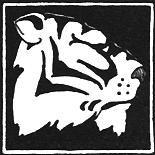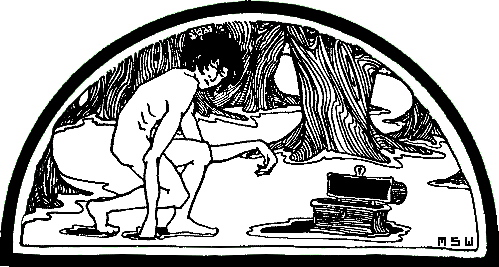 |  |
Wild at Heart Homepage | Contents | Previous Chapter
CHAPTER X
TIGER
1

Roused from his long, deep sleep of exhaustion, the first sounds that Nanga heard were the cries of men, and he acted just as a trapped animal would have acted. Without reflection, without a thought for Parmala, he swarmed instantly up the nearest tree, and settled himself in its leafy top as in a cradle, eyes and ears straining in the direction of the sounds.
So intent was he on the hubbub that he did not hear the girl’s little gasp of consternation at his disappearance, nor see her agitation as she fled, wildly wavering between the need of avoiding the villagers and the need of finding him. His mind could only grasp the fact that the wood was full of men.
He was hardly afraid. He knew that man never looked upward. He was interested, rather, in something that was now half familiar to him. Men--what did they want? What would they do?
He saw them against the skyline at the top of the wood, dark figures bending down and chattering to one another. A moment later, and they were standing in a little clump, looking down toward him, but not at him. One of them was pointing at something black on the ground mid-way between himself and them.
Now they were all looking eagerly at it--the fat man who seemed to be more troubled than the rest, the shriveled man, the man bearded like a goat; as many men as he had fingers to tell them by.
And now they had all fled.
What a ridiculous, incomprehensible thing man was! Like a sounder of pig startled by a shadow--here one breath, gone the next, over the skyline and away!
Why had they ever come out?
His mind went back then. Man’s daughter had come from the village, and he--he had fallen asleep with his head on her knees. But he had awakened alone.
The dark figure stumbling among the trees; the following and the finding; the face and the scent and the soothing fingers; the peace of the moonlit woods--had he dreamed it all? Or had man come down and taken her away while he slept?
He put his head in his hands. He pressed down his eyes, to find if darkness would bring back to him the sweet scent or the feel of fingers. But, though he made a darkness, he could bring nothing of her back.
They had taken her away, then. They had taken her away while he slept. There, up the hill, where men still murmured like angry bees, was she. There, darkly hidden in one of those puny dwellings, was she who had shared with him moonlight and the freedom of the woods. That was what man had come out for; and, having got it, had fled.
A spasm of rage shook him. If he must batter down their walls and tear their woodwork with his teeth, he would have her back. For she alone stood between him and the hunger and the aching--she who was his as surely as his own hands were his.
His! his! his! In that rage of possession he snapped thick branches and tore them to shreds; he dug his nails into the palms of his hands till the blood flowed; he clutched at the air, as if so he might change it into flesh and blood, and raved at its emptiness. Then, when no transports of passion availed to bring her back, he flung himself out of the tree and rushed wildly uphill, intent on the village.
But his course lay past the tin box. And by the tin box he stopped, suddenly sobered.

And by the tin box he stopped, suddenly sobered
There were strange tidings on that dank air--strange scents that mingled but ill with the smell of the lichen and the leaves and the rotting boughs. Of her there was a fragrance, indeed. But it was faint and fleeting, and it went as it came. Almost ere he could be sure of it, he was sickened with another smell, the smell of blood, newly shed, not far away; and at that he shuddered, for it was unclean to him. But what stuck in his nostrils and throat, what caused the very hair to stiffen on his head, was the taint of tiger.
Tiger! It tasted in the mouth; it stank like decay itself. It filled, it poisoned the air, because tiger--he knew it, he knew it--had tasted the flesh of such as he.
All at once he seemed to droop and to shrink into himself, like an animal wounded in a vital part. For the air--the air, that never lied--had shown him three things: She had passed by. The destroyer had passed by. And there was blood on the air.
2
So, after all, man had not taken her back. He had to deal with an enemy far more terrible than man. And she--was dead.
His rage fell from him. There were no in coherent spasms now, no contortions of the hands and face, for they had given place to something deep-set and powerful--a cold, calculating hate, remorseless, not to be satisfied. There was for the first time a set quality in his face, a haggard grimness that boded ill for an enemy. The boy had become man.
Standing up to his full height, as became a man, and glowering down the glen, with his knit brows and his crown of long hair tossed back from his face, he might have been some wild, primeval king of the woods challenging an intruder. For, thin and scarred and grimed as he was, there was a poise of great freedom, almost of nobility, in his tanned, tense body. But that he should pit himself weaponless against the huge and hulking beast that even now was slobbering the blood of another man was laughable. Yet such was his purpose, and such would be his purpose to the end of his days. It was as if the shadow of the Ridge itself had fallen suddenly across that sunlit place and had left its black mark on his brow.
He looked long and well. The sun had cleared the trees, and the quivering life of dawn, evinced in a thousand sounds besides the crow of cock and call of partridge, had given place to the more sober murmur of day. Nothing interrupted the monotonous hum of the bees and flies in the tree tops; and nothing, till his eye traveled upward, seemed to stir. Then he saw that which he had known he was bound, sooner or later, to see.
Like a brown leaf against the vivid blue, a single vulture was swaying. Even as he watched it, it swooped lower in a ponderous circle, till he could distinguish its bald head and skinny neck, as it hovered, pointing at some dark nook among the tangled trees.
If he had ever doubted, this would have put an end to the doubt, for no vulture points at anything that is not dead. Without further delay he was down on his hands and knees, taking up the trail.
He might have to go far, he knew, for the tiger of the Ridge always dragged his victims into thick and thorny places. Also, men had been shouting, and that would drive him even farther than was his wont; and it was a light, frail thing that he had killed.
So Nanga went carefully, making his casts to right and left like a hunting-hound, for the scent was fitful on the dry ground under the trees. At times he could see clearly the track of the dragged body, scored in the dust. At other times it seemed to have been lifted. But always, when a gap in the leaves served him, he could set his course by that wide-winged bird that hung so patiently in the air. And in due time he was right under it, and knew that the place must be very near.
There was a hollow ahead, he remembered, a watercourse, nearly dry, shrouded in brambles, very deep and still. In that he would surely find what he looked for.
Now, he was very near indeed. He could see the thick thorns that hedged the banks, and hear the faint trickle of water deep down. And the trail--the blood and the reek--was very strong. But wait: he must have a plan ready.
What should he do? Get right above it, and drop from the high bank like an ape? Then straddle the beast’s back and strangle with his hands?
But could his hands ever get a grip of such a neck?
Use his fingers, then, and gouge out its eyes? Better that. His fingers in its eyes--
Ah! A tearing, chopping sound, a little way up the bed, where the banks narrowed into a tunnel.
He crept up, hand over hand. Looked down. It was dark there. The bushes met in an arch over the stream; and in the bottom water flickered misleadingly. He could not be perfectly sure what was water and what was not: the ripples kept forming into stripes. Points of light, too: were they eyes? A little nearer, a little farther over the edge, and he might see--
But he forgot his feet. Poking and peering over the brink, he left them to themselves, and they dislodged one pebble. One loose pebble, tinkling into the bed of the stream. It was a little thing, but it was enough. There was a start and a snort down in the shadows. Then, over the white shingle upstream, the flash of stripes and one whisk of a long tail. Finally, only a moment later, with a downward rush of brown wings, with neck outstretched and beak wide, the carrion bird supplanted the carrion beast.
It was all over. Fool that he was!
He could stay no longer. He had failed. The sight of the bird and the odor of death afflicted him to faintness, so that his head swam and there was a sickness in his stomach. He had not even the heart to look down again into the gloomy tunnel and make sure of what must be lying there; for between him and it there was stretched an unclean curtain of blood that nothing could now make him face. His nostrils, all his senses, rebelled. And, after all, what could he gain by looking? She was dead.
Another step, and he would have seen, lying oddly twisted on the stones by a little red pool, the body of the dead fakir. Another step, and his mind would, in one respect at least, have been at rest. But he never took that step. Persuaded that she was lost to him, he turned and crawled back till clean air drove the taint of blood from his nostrils. Then, with his chin on his hands, he lay a little and pondered.
The tiger would not come back. It would make for the Ridge now; in a hurry too, for it was high time. But dare he follow?
It had seen him. It had been warned. From behind any bush, any tree, there might be a sudden spring, and a sudden ending. No, that would not do. Even an elephant would not follow in the steps of a tiger that had been warned. Certain death lay that way. But was there no other way?
He could travel faster than a tiger. He could get ahead; lie in wait. An open place, where his enemy must pass, where he himself could see without being seen--that was what he needed. Now, was there such a place?
Suddenly, a picture came into his mind, a picture of a giant wedge-shaped rock that hung out at the foot of the cliff just below the ford in the river. Often and often he had lain there, sunning himself after a bathe, and had watched the otters fishing, and the buffaloes, and even the men, crossing over. But neither otter, nor buffalo, nor man had ever seen him, for there was a hollow in the platform of rock that just took his body; and the mellow rock was, like himself, berry-brown. A cliff above, curtained with tangled greenery--the very place. From there he could see without being seen. From there he could command not only the ford but all the river. And, to gain the Ridge, the river must be crossed, somewhere.
His plan was made. He turned and, bent double, made for the river at his best speed. His method of progress was all his own--an amazingly rapid shamble, not unlike the bear’s full speed, with hands as well as feet to help him. So, where a man would have been baffled at every turn by trees and the debris of trees, he passed through without pause and soon gained his rock.
There he lay panting, listening with all his ears.